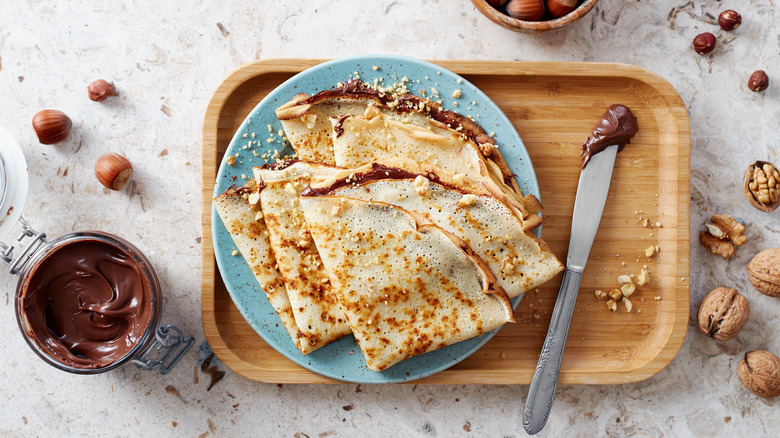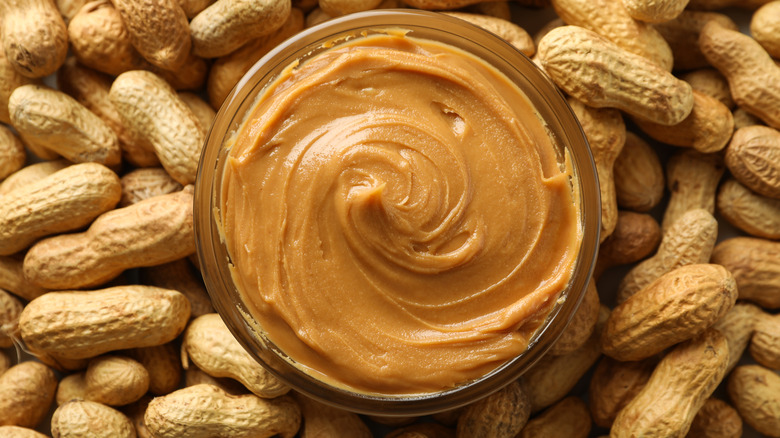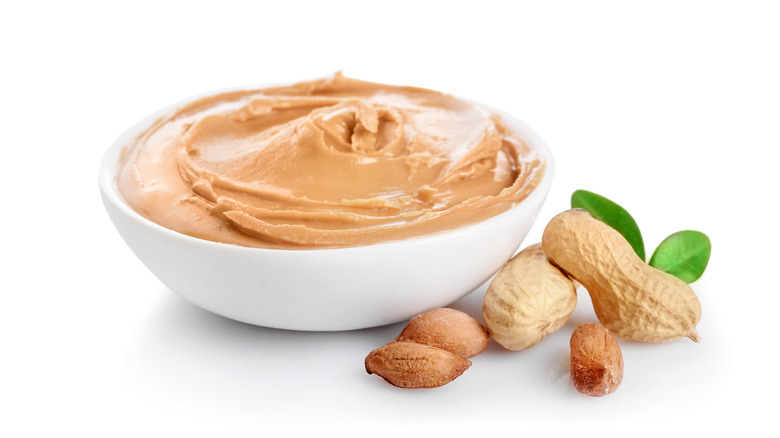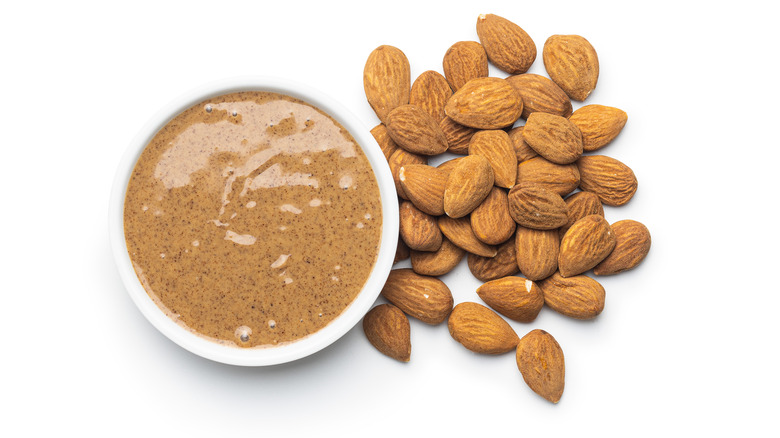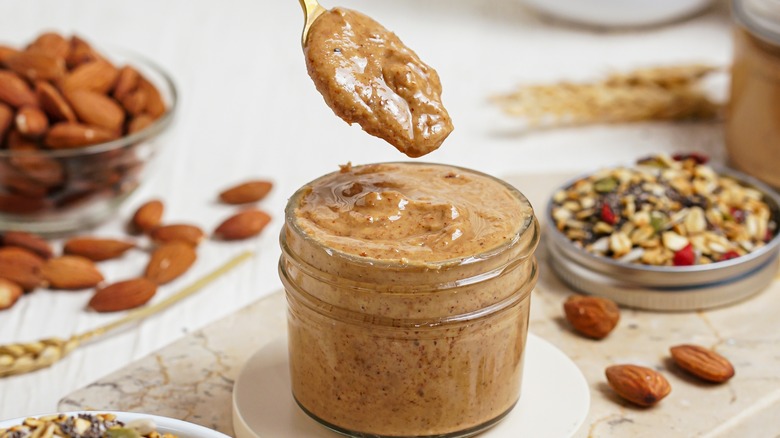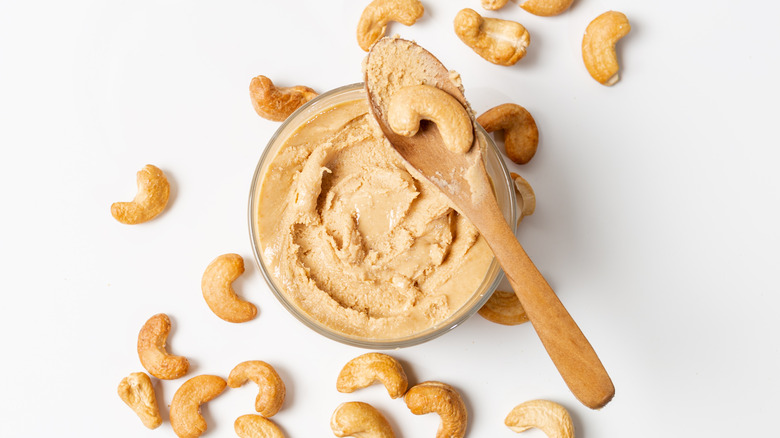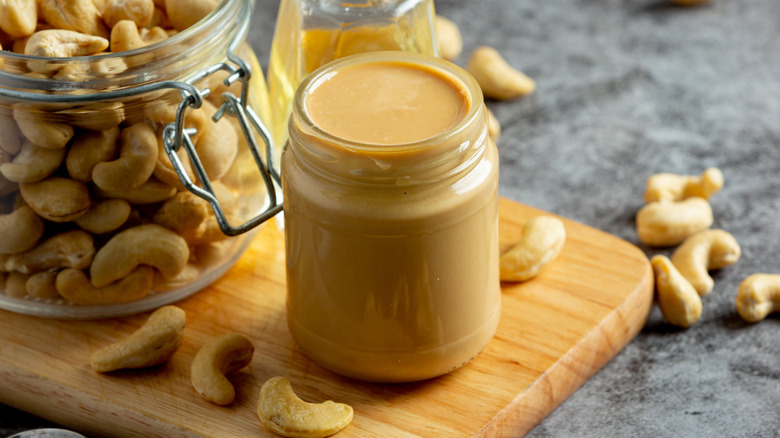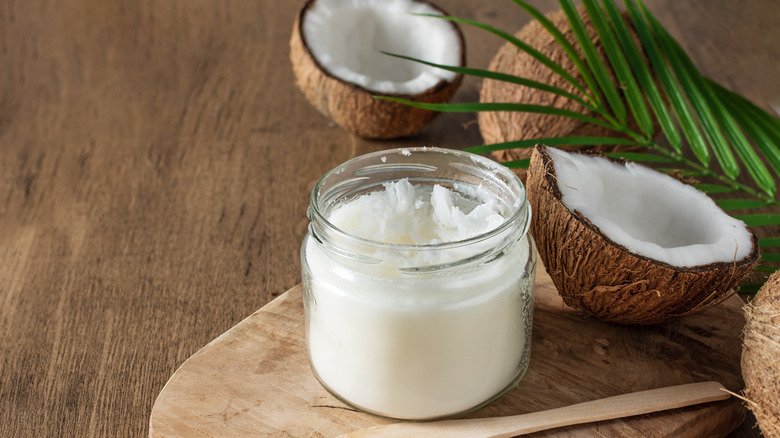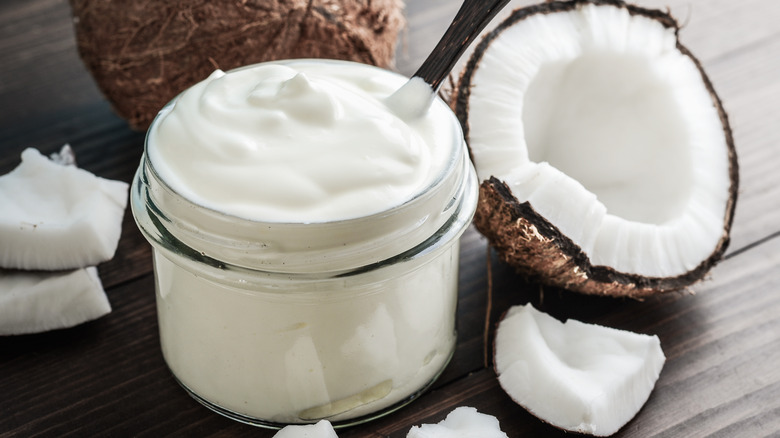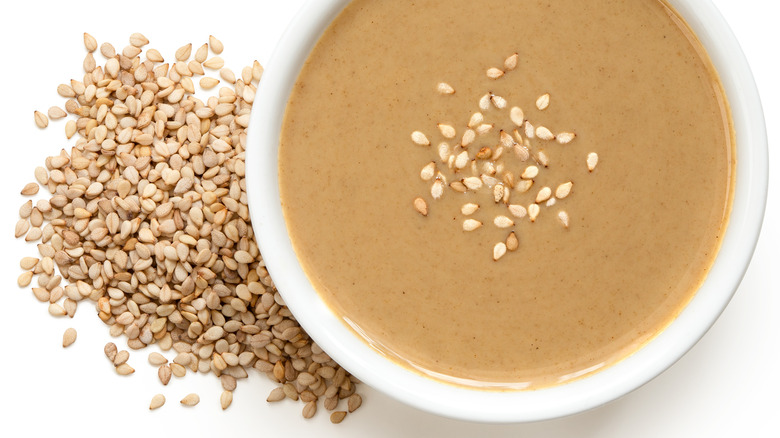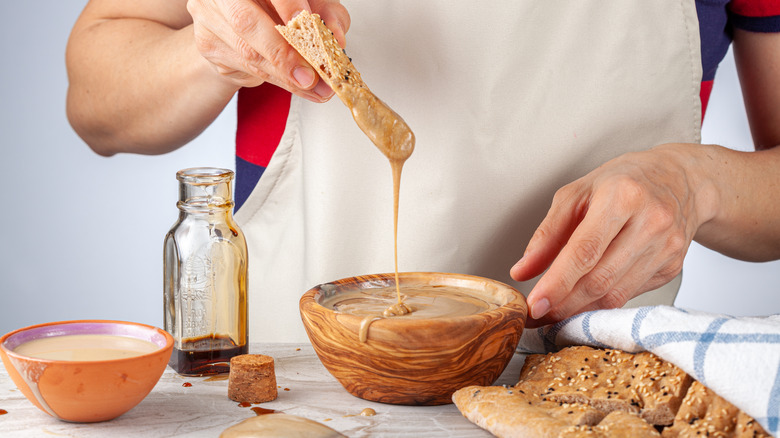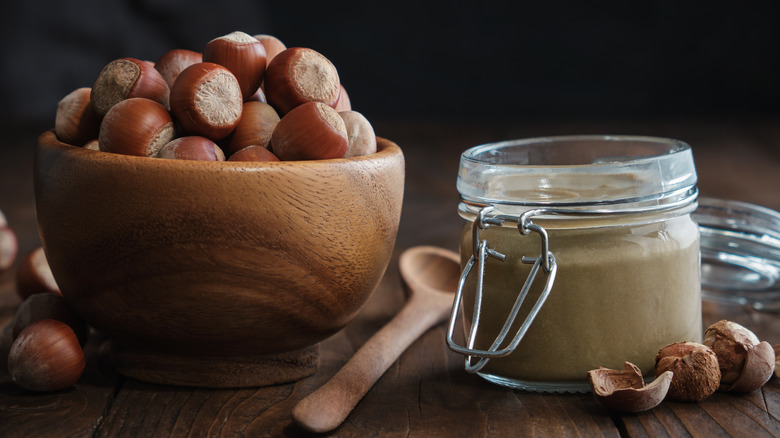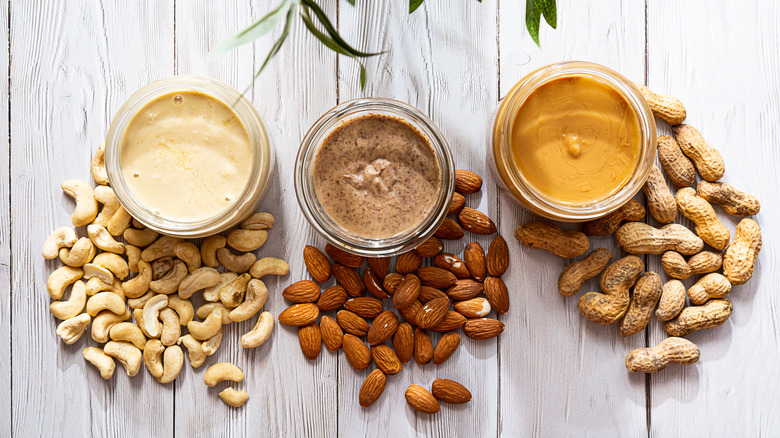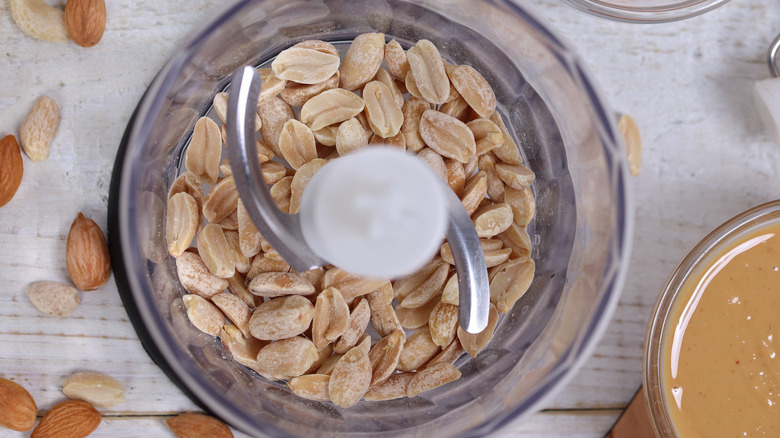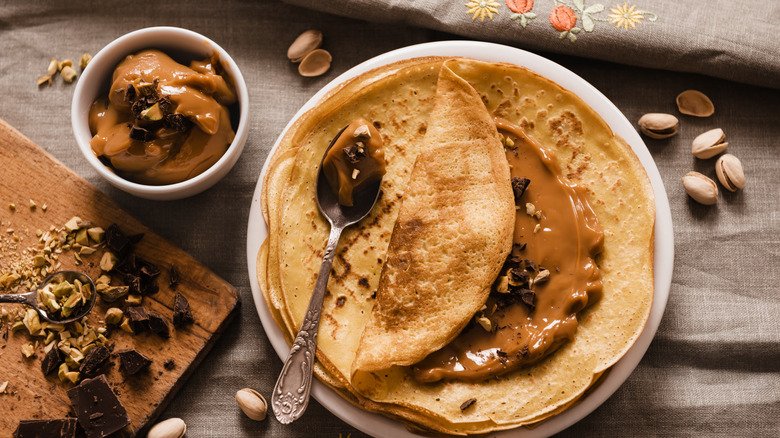The Best And Worst Nut Butter Brands For Your Health
Nut butters have become extremely popular in recent years. Sandwich enthusiasts have even started leaving their peanut-butter-and-jelly comfort zones, pairing hazelnut butter with chocolate and pistachio butter with strawberries. Given how profoundly simple it is to create nut butter — you just put a lot of nuts together and grind them into a paste — it's not surprising that there's seemingly no limit to nut butter innovation.
As Entrepreneur observes, so many brands nowadays are hopping aboard the nut butter train and elbowing their way into a very crowded market. Some brands do it with high-quality organic ingredients that shine on their own with their natural flavor and texture, but others take the extra step and add a variety of artificial flavors to further enhance their products. Unfortunately, this means that the offerings from the latter group aren't exactly the healthiest options out there — and even though their products might taste delicious, you would be much better off omitting them from your diet. Here are the best and worst nut butter brands for health-conscious consumers.
Peanut butter brands to buy
Let's start with the OG, all-time favorite: peanut butter. Some would argue it's still the best nut butter there is, though others have moved on and found other favorites. Those who favor alternative nut butters may even point out how peanuts aren't actually nuts at all. Regardless, when it comes to talking about nut butters, peanut butter is still the first one that comes to almost everyone's mind.
There are plenty of amazing and delicious brands out there that really take pride in making healthy peanut butter without any added sugars, artificial thickening agents, additives, or colorings. Saveur lists Santa Cruz Dark Roasted Creamy Peanut Butter as the absolute best in terms of taste, texture, and composition (just "organic roasted peanuts" and "1% or less of salt," as the label says). Of course, there are other healthy peanut butter options out there, including Crazy Richard's 100% All-Natural Creamy Peanut Butter, 365 Everyday Value Organic Peanut Butter (the unsweetened and unsalted version), and Trader Joe's Creamy No Salt Organic Peanut Butter, made from Valencia peanuts (via Healthline).
Peanut butter brands to avoid
Unfortunately, this particular list can be quite long. There are many peanut butter options on the market that may look healthy, but actually have not-so-healthy ingredients.
Eat This, Not That! lists Skippy, Peter Pan, Great Value, and Smucker's as some of the worst peanut butter brands you can find on the shelves, with their products having synthetic ingredients, dry or unpleasant texture, and an insane amount of added sugar. Other peanut butter brands you may want to avoid are Member's Mark, Reese's, and even the beloved Justin's PB (which some people think of as "healthy," just because you can buy it in Whole Foods and other similar health food stores). Most of these brands use artificial ingredients and additives (especially sugar) to enhance the natural flavor of their spreads.
Try an organic, all-peanut spread instead — you may even like the natural taste a bit more.
Almond butter brands to buy
One of the first kinds of nut butter that became popular as a peanut butter alternative is almond butter. Almonds are well-known for their vast health benefits, from reducing cholesterol and blood pressure to balancing out your blood sugar levels and preventing cardiovascular diseases (via a 2018 study in Nutrients). So naturally, almond butter would sound like an amazing ingredient to use in your sandwiches or add to your daily smoothie — the all-natural kind, that is.
Verywell Fit recommends Once Again's Unsweetened & Roasted Creamy Almond Butter, Barney Butter Bare Smooth Almond Butter, MaraNatha All Natural Almond Butter, and Artisana Organics Raw Almond Butter as excellent picks. What they all have in common: great flavor, satisfying texture, and high-quality almonds (and no additives) as ingredients. Once Again's PB is even certified gluten-free by the National Celiac Association, meaning their peanuts aren't contaminated with gluten-containing grains during the production process.
Almond butter brands to avoid
Just like with peanut butter, there are almond butter brands on the other side of the wellness coin, packed with additives that can be detrimental to your health. Jif Almond Butter, Justin's Classic Almond Butter, and the original Barney Butter Almond Butter are some of the worst brands you can buy in the grocery store, as you're bound to find unnecessary and even potentially harmful ingredients listed on their labels.
The aforementioned brands contain cane sugar, a lot of salt, and hydrogenated vegetable oils, which are known to contribute to inflammation in the body and wreak havoc on your immune system (via an article published in Atherosclerosis). Even if those products taste great, what you're actually tasting are the artificial ingredients and added sugar and salt, not the actual raw almonds that this type of nut butter is supposed to be all about. Real almond butter should taste a bit savory, just like all-natural peanut butter.
Cashew butter brands to buy
Another type of nut butter that has found its way to grocery shelves and into our homes is cashew butter. Cashews are rich in antioxidants, unsaturated fats, and a plethora of vitamins and minerals (via Verywell Fit), and they naturally contain higher amounts of carbs than almonds, hazelnuts, or walnuts (per data from the USDA). Clean Eating Magazine lists four cashew butters as their favorite: Artisana Organics Non-GMO Raw Cashew Butter, Jiva Organics RAW Organic Cashew Butter, Justin's Classic Cashew Butter, and Julie's Real Cashew Butter.
All of these brands have only a few ingredients on their list. They're organic and non-GMO, and they use only natural flavoring agents such as vanilla extract and cinnamon powder. That's how they differ from other brands on the market. Even their "additional flavoring" comes from real food and not synthetic compounds. Additionally, they are easy to spread, have a wonderfully sweet taste and texture even without added sugars, and generally pair well with any type of jam.
Cashew butter brands to avoid
Even though there aren't as many cashew butter brands out there, there are still some that add unnecessary (and potentially harmful) ingredients for the purposes of enhancing the flavor and texture of the products.
Offerings like Crazy Richard's Cashew Butter, Trader Joes Creamy Salted Cashew Butter, and Once Again Unsweetened Creamy Cashew Butter either have added vegetable oils or too much salt. In the case of Once Again's product, its taste was described by Minimalist Baker as "almost rancid" and "very bitter and unpleasant."
Generally speaking, cashew butter products are still considered to be something of a novelty, so you won't really find as many of them on the market as you'd find peanut butter or almond butter varieties. Still, while cashew butters aren't exactly everywhere, it's likely that the coming years will see a more robust selection of healthy (and not-so-healthy) options as this nutty spread continues to grow in popularity.
Coconut butter brands to buy
While many of us may be familiar with coconut oil, coconut butter can be considered as significantly less mainstream, especially when compared to other spreads available on the market. Even though real coconut butter isn't as sweet as other coconut-based foods (think Raffaello), its natural sweetness can sometimes be misleading (and may make you think that there's added sugar in it).
Coconut butter brings a myriad of health benefits, from supporting the immune system and aiding in weight loss to its antibacterial properties and disease prevention potential (via Dr. Axe). That's why the best coconut butter products are mostly made up of pure coconut, with a limited number of other natural ingredients.
According to the Natural Food Republic, some of the best coconut butter brands include Artisana Pure Organic Raw Coconut Butter, MaraNatha Natural Coconut Butter, Nikki's Coconut Butter Vanilla Cake Batter, Nutiva Organic Coconut Manna, and Kevala Organic Coconut Butter. They are all organic, sugar-free, and free from GMOs or other artificial ingredients. They also have a smooth texture and a delicious flavor.
Coconut butter brands to avoid
A quick look at commercially available coconut butter brands would suggest that there aren't really a lot of them out there trying to make their products taste different from how they should in the first place. Most of the coconut butter brands frequently cited in food blogs and nutrition websites are all made without any artificial ingredients.
It all comes down to your preference, particularly in terms of taste, texture, and price point. You might, however, see coconut butter as one of the ingredients in mixed nut butters such as Wild Friends Foods Chocolate Coconut Peanut Butter or BARNEY Cocoa + Coconut Almond Butter, which contain added sugars, palm oil, and even ingredients like chocolate liquor and sunflower lecithin.
That said, it's not improbable that you'll come across certain products with coconut butter that aren't exactly the healthiest options for you. Always check the label, and avoid products with an abundance of added sugars or artificial fillers.
Tahini brands to buy
This Middle Eastern staple is a roasted sesame seed butter that is incredibly rich in flavor and can best be described as umami, the fifth basic taste (via the Umami Information Center). It can be used in a variety of dishes, from hummus and sauces to dressings and even brownies.
Tahini is thick and full-bodied, and it adds a depth to every dish. Some of the best brands on the market include Mighty Sesame Tahini, Joyva Sesame Tahini, Soom Foods Pure Ground Sesame Tahini, and Har Bracha Tahini Paste (via Epicurious). These brands were recommended by top chefs, bakers, and food writers who agree that the best tahini "should taste good to you in its raw state, straight out of the container" (per The Strategist).
According to Bon Appetit's senior food editor Andy Baraghani, high-quality tahini should be more homogenous despite its high oil content, because "if it's been processed properly and hasn't been sitting on a shelf for months, you'll see less of the inevitable separation."
Tahini brands to avoid
Given how it's made from sesame seeds — which are highly nutritious and rich in antioxidants, as supported by data from a study published in the Journal of Medicinal Food — you can't really go wrong with tahini in general. Per Healthline, it can even decrease your risk of developing serious illnesses like type 2 diabetes and heart disease. That's why it's so important to find high-quality tahini brands that don't overload their products with oil and artificial additives.
Luckily, there aren't many brands out there that put ingredients in tahini that shouldn't really be there. However, there are certain options you might want to skip due to how they fare in the flavor and texture department. According to Milk Street, some of the worst tahini brands include Artisana Organic Raw Tahini (for its bitter, somewhat metallic taste and gritty texture) and Prince Tahini (which reportedly tastes like it's going rancid, and has a "very dark" and "off-putting" color).
Other nut butters worth adding to your list
In addition to the aforementioned nut butter varieties, there is an entire list of nutritious and noteworthy (albeit lesser-known) "newer" creations, such as macadamia nut butter, hazelnut butter, walnut butter, pistachio butter, sunflower seed butter, pecan nut butter, and pumpkin seed butter. As they're made from different kinds of nuts and seeds, they each bring a distinct texture and unique flavor to the table.
And then there are nut butter combinations, with many brands looking to bring these rich flavors together in order to create something even more delicious. Usually, they add cinnamon, vanilla, or honey to enrich the flavor, but just like with the other nut butters on this list, it's wise to stick to real, natural ingredients and stay away from products with synthetic additives. Popular brands include Futters Walnut Butter, The Pistachio Factory Roasted and Sea Salted Pistachio Butter, and Meridian Natural Energy Crunchy Hazelnut Butter (via Delish).
Ingredients to avoid in nut butters
When it comes to reading labels and actually choosing the healthiest brands of nut butter out there, it's important to know which items have no business being on the ingredients list. These include hydrogenated or partially hydrogenated vegetable oils, added sugars, excessive sodium, and all artificial ingredients (additives, fillers, colorings, thickening agents, and flavor enhancements).
All of these ingredients can be potentially harmful for your body, causing digestion issues and inflammation, overloading your immune system and making it difficult for your body to fight off pathogens (via an article published in Nutrients). It's also worth noting that certain brands that offer nut butters with "reduced fat" (which are typically marketed as healthier options) actually end up substituting the fat "with inactive and artificial ingredients like soy and other synthetic carbohydrates to increase protein and texture," according to registered dietitian Trista Best (via Eat This, Not That!).
How to make nut butters at home
Making nut butters at home is actually fairly easy, as it only requires a good, high-speed blender, any "nut" of your choice, and your patience. According to the experts at Minimalist Baker, all you have to do is pick your main ingredient (or a combination of ingredients), decide whether you want to use them raw or lightly roasted, and blend them all together until the mixture becomes creamy butter.
When you first start grinding your nuts, they will look like flour. Stay consistent and patient with your blender, because the blending process usually takes about 10-12 minutes. While your nuts are blending, you can decide whether or not you want to add some spices, vanilla extract, and natural sweeteners like honey or coconut sugar to ensure that your nut butter suits your preferences. And the best thing about making nut butters at home? You get to decide which the ingredients go into the mix, so you can be sure that your homemade nut butter will have no hidden sugars or artificial flavors.
How to easily incorporate nut butters into meals
Nut butters are extremely versatile, and they can be used in a wide variety of recipes. They're just as amazing in desserts as they are in savory dishes, and with their rich flavor and texture, you can dare to experiment and find the best nut butter for your dish.
If you're just starting out and finding it hard to figure out how to best pair your favorite nut butter with other ingredients, Self Magazine has a few creative ideas you might want to try, including kale chips with almond butter, cashew butter chicken, peanut butter and basil sandwich, and almond-sesame soba zoodles.
On the other hand, if these recipes sound a little too adventurous for you, you can simply experiment with different nut butter flavors during breakfast time and add them to your regular morning oatmeal, smoothies, smoothie bowls, pancakes, waffles, or toast.
